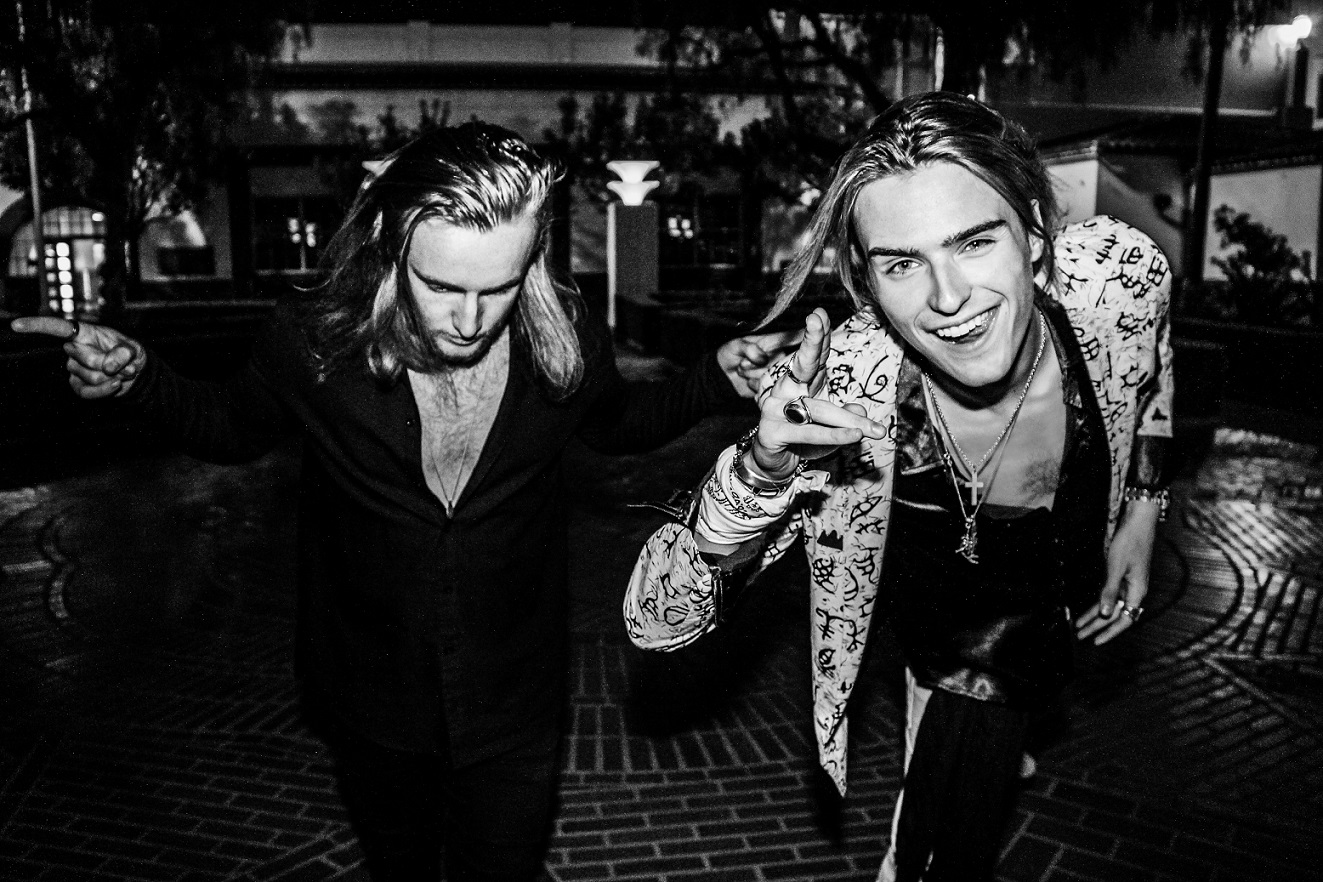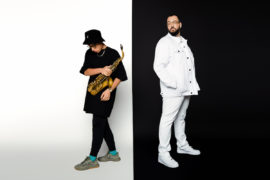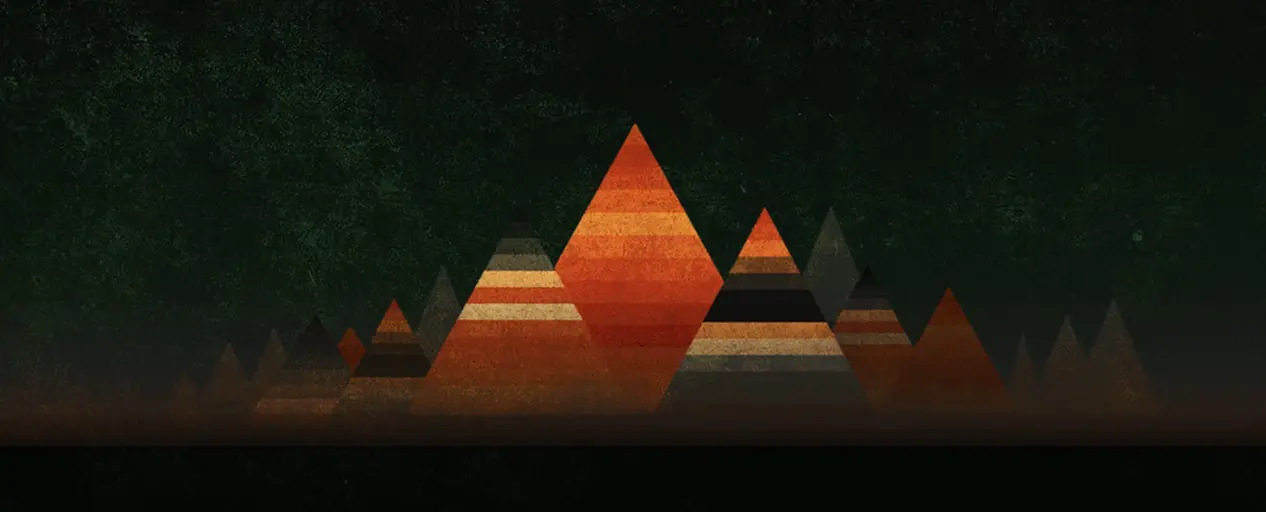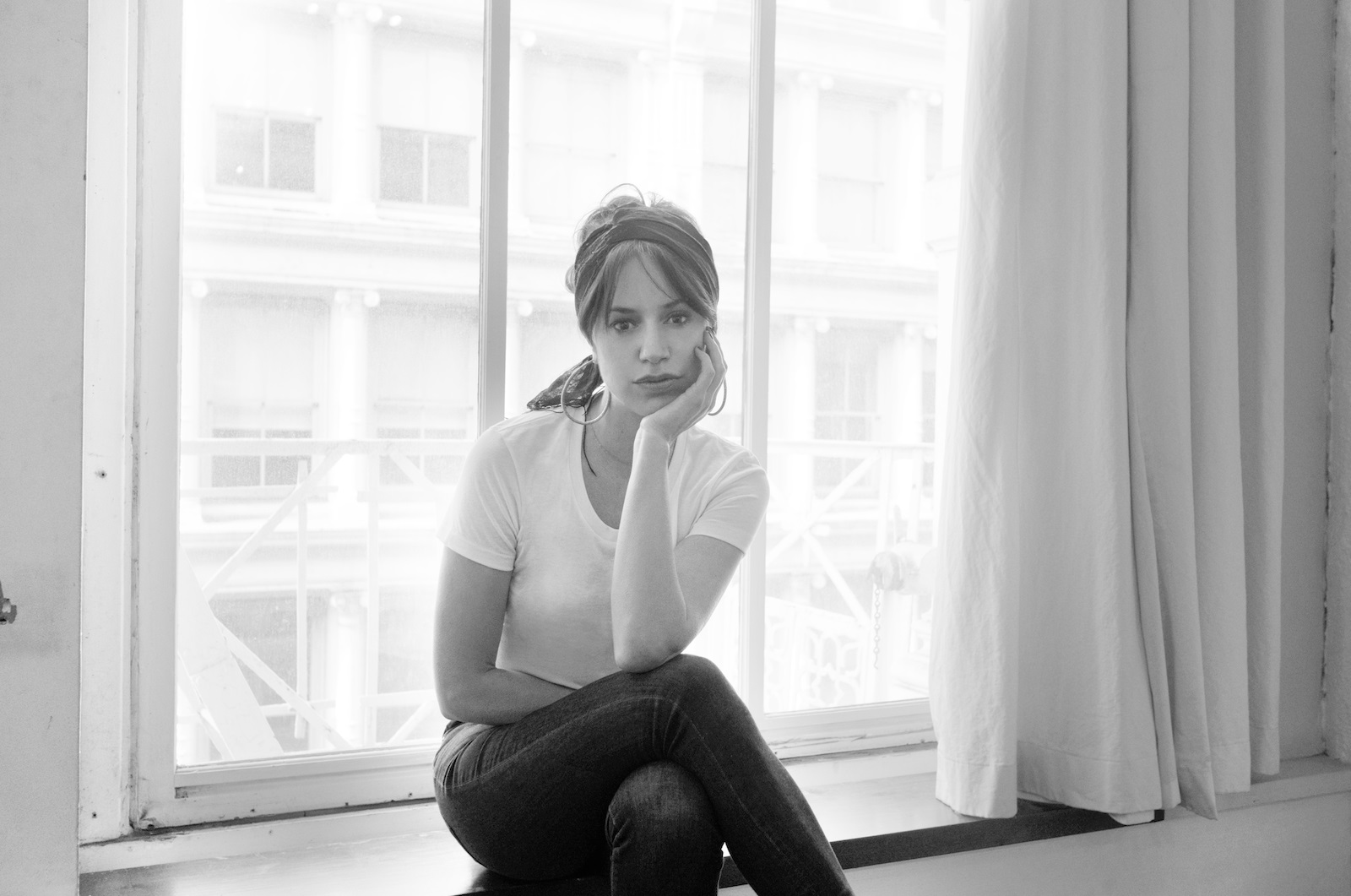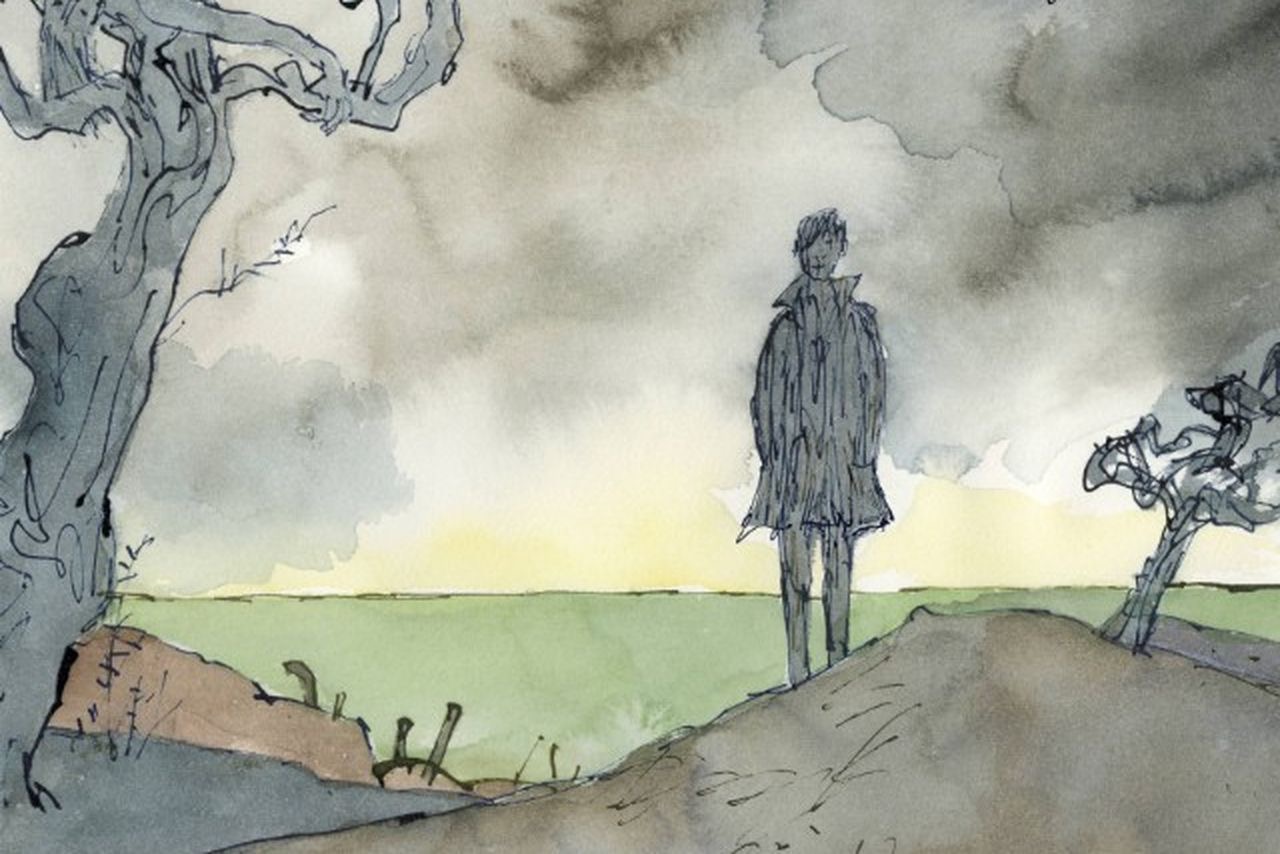Nina Nesbitt opens up about her beautifully intimate third album ‘Älskar’ in a candid conversation about family, roots, songwriting, and love in all its messy, raw forms.
Stream: ‘Älskar’ – Nina Nesbitt
It’s safe to say Nina Nesbitt is feeling the power of love these days.
Beyond recently reaching a career milestone of a billion streams, the Scottish singer, songwriter, and producer has been celebrating ten years in the music industry with a special project that explores the most visceral, magical, and wondrous of emotions: As beautiful and buoyant as it is intimate and aching, Nesbitt’s third album Älskar is a dazzling deep dive into love in all its messy and raw forms.

I wanna scream your name
Into an еmpty canyon
So I can hear it back a thousand times
Wе got nothin’ in common
But we fit better than pills in a packet
I wanna be your late-night habit
If you let me (Yeah)
You’re the kinda flame I don’t wanna burn out
I would give you my heart
Let you tear it apart, Älskar
Is it all that you want, is it?
‘Cause you know, for your love, I would die for it
I would give you my heart
Let you tear it apart, Älskar
Released September 2, 2022 via Cooking Vinyl, Älskar is a breathtaking foray into Nina Nesbitt’s heartfelt depths and inner sanctum. The follow-up to 2019’s critically acclaimed The Sun Will Come Up, The Seasons Will Change sees the 28-year-old artist curating a cohesive and cathartic listening experience, whose soaring highs and stirring lows are innately connected to a universal theme of love – in particular, the kinds of love Nesbitt has experienced in her own life. The word “älskar” itself means love in Scottish Gaelic; titling her record as such is just one of the many ways in which Nesbitt also honors and tributes her own heritage (her father is Scottish, her mother Swedish) throughout the album.
A longtime Atwood Magazine artist-to-watch previously praised for her “poetic lyrics within pop melodies [that] create the perfect storm of sensibility and likability,” Nesbitt has enjoyed a meteoric rise over the past decade. Älskar builds upon the promise of her past work, showcasing her most vulnerable, heartfelt, and profound songwriting to date through captivating pop anthems (“Pressure Makes Diamonds,” “No Time [For My Life to Suck]”) and tender, disarming ballads (“Older Guys,” “I Should Be a Bird,” “Colours of You”) that stop us in our tracks.
I should be a bird
But I don’t really feel like flying
‘Cause my wings are hurt
Yeah I’m tired of trying
For Nesbitt, every one of these twelve songs is deliberate and intentional; she truly poured herself into this album, holding nothing back in exploring the beauty, as well as the pain, that come with love.
“I thought that to love was to give yourself away,” she sings candidly on the gut-wrenching “Older Guys,” whose visceral exploration of love as power reads like a warning tag for the next generation of doe-eyed romantics. “Wish I knew what I know now back then, ‘cause I wasn’t a woman yet, but you were a man.”
”I feel that I’ve processed so much and learnt a lot about the relationships in my life during the last few years,” Nesbitt explains. “I wanted to capture all types of love in their raw forms, whether it be romantic, heartbreak, friendship, coming of age, familial or self–love. The album talks about a lot of things that I wouldn’t necessarily talk about normally. I think it’s got a lot of cold, deep, and dark subjects on it among the pop songs, and I hope that people listen to it and think, ‘Oh my God, I’ve been there!’”

Of course, this isn’t just love in all its raw and messy forms; it’s Nina Nesbitt herself, in all her raw and messy forms.
Many songwriters have scratched the surface of love, but in Älskar, Nesbitt gets underneath the hood. She dives deep and gets her hands dirty, processing love’s complexity in real time and coming to better understand herself through her relationships with family, friends, partners new and old, and of course, herself. Reflection reigns supreme on Älskar, a truly sentimental and grounded album that leaves us with a warm and knowing smile.
Nina Nesbitt is definitely feeling the power of love, and we’re right there with her. Nesbitt recently spoke to Atwood Magazine about songwriting, her own personal and professional growth, rediscovering her roots, and the journey that was writing and recording this album. Dive into our in-depth interview below, and steam Älskar wherever you listen to music!
— —
:: stream/purchase Älskar here ::
Stream: ‘Älskar’ – Nina Nesbitt

A CONVERSATION WITH NINA NESBITT

Atwood Magazine: This year marks your first full decade in the music industry, and I wanted to start our conversation off by acknowledging that milestone. How do you feel you've grown as an artist over the past ten years, and how have you learned to navigate the music industry over that time?
Nina Nesbitt: I feel like I’ve grown a lot, but also not at all because the industry has completely changed, and it changes all the time. It’s so fast-moving, so I feel like once you get the hang of things and you feel like you’ve mastered it, it’s changed again and you’ve got to re-learn it. I think it’s taught me to evolve and be open to change and learn to adapt too, whether it be new music styles or new forms of social media or whatever it is. I think it’s definitely taught me to be open-minded, keep evolving, and I guess I’ve just matured as well with my writing.
What does evolution mean to you in that regard?
Nina Nesbitt: I guess for me, it’s I’m very project based, so like, I like to do a project over two-three years and just dive into a world and kind of learn things about myself, learn things about other people, learn things about situations I’ve been in and just really dive deep and see where that takes me. Yeah, I guess just doing a project, and it’s almost like a little bit of therapy each time.
I love that. Can you pinpoint changes in your own music and art, when you look back on your past two albums and all the singles that you've been putting out in between?
Nina Nesbitt: Yeah, definitely. I think I released one album when I was I think about 18, 19. That one never came out in America, but I think my songwriting has definitely developed since then because I didn’t collaborate with a lot of people. And then when I was just songwriting for a couple of years for other people, I think that’s when my kind of songwriting and production and everything really changed, and I think hopefully got better. And I just, I think through working with other people and seeing what my strengths were, what my weaknesses were, and just kind of how other people work is so interesting. And I think you can pick like little bits from each person, and you can learn a lot. So I think, yeah, collaborating with a lot of people, writing with other artists as well, has taught me a lot about myself. So, yeah, I guess just collaborating with a lot of people and putting a lot of stuff out and seeing what’s connected and what wasn’t and just kind of, yeah, taking it from there, I guess.

We last spoke a few years ago around your sophomore album, The Sun Will Come Up, the Seasons Will Change. What did that album represent to you, and how has your relationship with it changed since its release?
Nina Nesbitt: So the symbol for the last album was a lotus flower and I think that kind of represented the album really well. It’s like something that grows from a dark place in the murky waters, and then emerges into this beautiful flower. And I think the album was about like finding yourself again after being in a dark place and whatever that meant to people who listened to it, you could kind of take it your own way. But yeah, for me it was just like… I didn’t even know if I was going to be an artist again or make an album. It just kind of naturally happened and then I thought, I just want to make an album and put it out. I wasn’t expecting anything and it led me to this whole amazing journey of getting to see America and Australia, and it’s just such an amazing life experience. So yeah, I think it taught me to give things a go, and you never know what can happen in the music industry. It was a really, really cool experience.
I kind of feels like you've had two debut albums.
Nina Nesbitt: It really does!
That album was a reintroduction in so many ways. How do you feel you've grown and changed in the years since making that record?
Nina Nesbitt: I think I’ve fully entered adulthood with this record, which is a scary place to be. [laughs] I think the last record, I still felt I was figuring it out. And then on this record, I feel like I’ve dealt with a lot heavier things and written about that. I just think they’re quite different records and I feel like a completely different person on this one. I think everyone feels so different after the past few years. I was just trying to document that, I guess.
But I think I wrote this album from a very different place to the last one because the last one I wrote more as a songwriter. A lot of the songs were for pitch for other artists and stuff like that, and I ended up keeping them. So it wasn’t written for me as such, whereas with this one, I got the opportunity to work with amazing producers and go in and it was for me. So it was a really different process. And I think lyrically, it’s a lot more personal – it was a bit of oversharing, probably, but I kind of like that! They’re quite different records in that way.
In that vein, I've met some songwriters and artists who’ll end up writing 50 or 100 songs, and they choose the top 10-12 best, and then there are some folks I know who write just 12 songs, and that's the album! What was Älskar like for you?
Nina Nesbitt: I didn’t write that many songs! I think the last record I wrote hundreds because that was essentially my job for two years, whereas this one felt like… I just kind of wrote when inspiration struck me or when a song came out, and I did writing sessions and stuff, but yeah, it was much more focused and like less kind of… I don’t know how to describe it. Less regular. Does that make sense? I was just writing when I felt like I had to write something, which is a really different way of writing. But I think you can write a lot of shit songs if you write every day, and sometimes it can be good ’cause you kinda get into the swing of it and you write really good songs through that, but I feel like the best songs just kinda write themselves, as cliché as it sounds. They just kind of come out. So yeah, it was more I wrote in a very different way and it was a kind of stream-of-consciousness, just set up a mic or pick up a guitar and just like a word vomit almost until the song was written, so it was quite a different way, less logical.
It sounds like there's a major difference between those two processes, writing as a songwriter versus writing with a very personal vision for an artistic project.
Nina Nesbitt: Yeah, definitely, I think I instantly know if I’m going to keep a song. It just has something that I’m like, “Oh, I can’t give this away,” but I still love writing for other people, and I love writing for pitch like for DJs and stuff, and you just get out of your comfort zone for a day and be someone else, I guess. It’s definitely a different mindset, I think if I’m not thinking about writing like a pop hit or a song that’s gonna work on the radio or anything like that. When I write for myself, it’s just kind of like a passion.
What was your vision going into this record, and did that change over the course of writing and recording Älskar?
Nina Nesbitt: It did actually, it was quite a challenging record to make in terms of like logistically, because I went to visit my gran in Sweden, and when I was there, my publishers were like, you should try writing in Sweden, you’ve never done it. And I was like, Oh my God, I love Swedish writers. Why have I never done this? So I did five days writing in a row, I think I wrote like “Teenage Chemistry,” “Pressure Makes Diamonds,” “No Time For My Life to Suck.” Within those four days? And it was just… Yeah, it just came out in one week and I was like, Oh, I’d love this place, I wanna come back, and then I couldn’t get back into the country ’cause I gave my passport up. And it was really annoying for traveling, so I have a British passport, but I couldn’t get into the country for a year, so then trying to finish it, I was like, I don’t want to give up on the album and not finish it, but I don’t see how I’m gonna do it.
So a lot of it was over Zoom, which I find really challenging, just ’cause it’s such a different way of working, but I think you can kind of hear it on the album in parts, you can hear… There’s quite a lot of different production styles and stuff like that, but with the album’s theme, like the album is about love, and I feel like it’s kind of messy and raw and just… Yeah, it’s up and down. So I kind of think the album suits it in a way.
In our last interview together, you told me, “making an album is really special because people can listen back in decades to come and hear that one person's life story.” What do you hope listeners learn of your life story this time around?
Nina Nesbitt: I hope that they listen to it, and I feel like this album talks about a lot of things that I wouldn’t necessarily talk about normally. I think it’s got a lot of cold, deep and dark subjects on it among the pop songs, and I hope that people listen to it and think, “Oh my God, I’ve been there!” That’s alright. Someone else has been there too, or they hear it and they take a song when you lose someone, for example, I think that song can be taken and… People’s lives in lots of different ways. I hope that people just kinda find like a sense of comfort or connect to them and think, Oh, I’ve been there, and that’s made me feel alright because I thought I was the only one… Yeah, I hope people just kind of take it however they want with it. I guess it’s not really in my control how other people receive the record…
I love the thematic entrance, “Gaol,” with all those voices saying “love” in various languages. How did that come about?
Nina Nesbitt: So “gaol” is love in Scottish Gaelic. I wanted each like the start and then to be in the two different languages that I’ve kind of grown up hearing, but that was a very last minute addition, the intro… I just didn’t really know how it’s going to turn out, but I just asked people online, send my voice notes, So I did like a TikTok and an Instagram and I received hundreds of voice notes in different languages. I don’t even know what some of the languages are, I’ve just had to trust that they actually do say, I love you, I don’t know what some of them will say. All will be revealed on Friday, I’m sure, but… Yeah, I just thought it was nice because obviously, the album is a Swedish word, and a lot of people will see it and not even know how to say it, or have heard it before, so I wanted the intro track to be something that everyone could… Either hear their own language or in English or whatever, and think, Oh okay, it’s for me be… This is also my album. So yeah, that was kind of the plan with that.
Is that the first time you've done a crowdsourcing thing like that?
Nina Nesbitt: No, I actually did something on my first record, on a track called “The People,” which I literally haven’t listened to in about 10 years, but I went round to schools and recorded them, singing the outro. And it sounded really cool. So I think there was like maybe 5,000 people on it in the end.
Your album title Älskar means love in Swedish, and you’ve said that this album is about love in all its raw forms. What does this theme mean to you, and what inspired you to focus on this overarching theme of love?
Nina Nesbitt: I started thinking about making another album, ’cause to be honest, I just set out to make one, The Sun Will Come Up, and then it kind of surpassed any expectations and I was like, “well I should probably make another one then!” So I really was thinking hard about what I was gonna write about. And I was on tour at the time and my life was very surreal, traveling every day and playing these shows and I thought, well, no one can, no one wants to hear songs about that. What’s something that everyone feels? And then I was like, well, love is a very universal term and experience. And I think I hit 25 and I just felt like all the relationships in my life completely flipped. My romantic relationship felt more serious. My friendships felt different.
Like we were all, my friends had all left university and they were all smashing it with their careers and it was all exciting, but I was like, “oh my God, when do we have time to see each other?” And my family, like seeing my parents in a different light like as an adult, seeing them as humans and all their great parts and all their, maybe not so great parts. Maybe that sounds really bad, but just seeing things differently, I thought it was an interesting thing to write about.
I’m fascinated by the Swedish, familial theme in your music, and how you’ve embraced your family and your heritage. Can you talk about these ideas of heritage and birthright, and how you went about incorporating these things into your music?
Nina Nesbitt: Yeah, so obviously I was born and grew up in Scotland and I grew up with hearing a lot of Swedish. My mom would be on the phone for hours to my gran speaking in Swedish and it would like kick me out of the internet ’cause that was what happened back in the day. And I’d always listening to her conversations, but obviously not know what she’s saying and I’ve visited there. So I always had kind of, I think like quite a Swedish upbringing, but in Scotland ’cause it’s quite different. And yeah, just always been aware of it, but I didn’t spend enough time there to really feel Swedish if that makes sense. Until I started going more regularly and actually meeting people my own age and writing with them and getting to know them and hearing about their kind of upbringing and thinking, oh my God, that’s so similar.
And hearing about just like, I don’t know their school experience, their music college experience. And it just got me thinking like, oh my God, how different will my life be if my parents had chosen to move here instead of Scotland. And it just kind of made me curious to think, who would I be, what would I be doing? Would I be doing the same thing? I would speak a different language and it just kind of got me really curious and then I guess like learning more of the language and actually getting to speak to my gran and hearing her stories and thinking, oh, like we’re so similar, but we’ve not been in the same house growing up. So I guess yeah, a lot of those stories kind of fed into the music, but also sonically I grew up with Swedish pop music, whether it was Abba or American pop music, but a lot of it was written by Swedish songwriters. So yeah, I think I’ve always just been kind of influenced by that.
I think about your songs “Heirlooms” and especially “Dinner Table,” with the lyrics, “Three generations, we've all made our mistakes, I look in the mirror, I see your face in my face.” What does your Scottish and Swedish heritage mean to you?
Nina Nesbitt: I think it’s just as I get older, I think you think more about that as you get older. When you’re a kid, you don’t really think about where you’re from or what that means, and I think when you get older, you… Like I don’t have a big family at all. There’s literally three of us in my family and I think growing up seeing all my friends have got siblings and loads of grandparents and cousins and they have like a really solid sense of who they are, whereas I think I’m always kind of searching to uncover rocks as such to try and make sense myself. So yeah, I think the Scottish is definitely been really inspiring in terms of the storytelling in the folk side and then the Swedish is more the pop side, but yeah, just think as I get older, it’s just more interesting, and I think so much of who you are is passed on down through the generations above you, and if you don’t have a lot of them about, it’s just interesting to kind of explore that.
I like that – the Scottish/Swedish storytelling/pop mix. It's obviously an oversimplification, but it kind of makes sense in the mind, in terms of the artist you’ve become over the years.
Nina Nesbitt: I think so. I was always like, “Oh no, I don’t think Scotland influenced my music.” But now I think actually I was walking around Edinburgh, hearing buskers on every street corner talking about their lives and storytelling so it definitely has. I just thought that was normal and then I left Scotland and was like, “Oh, not everyone sings on the street.”
You definitely started the album off with story time in “Teenage Chemistry,” in which you paint such a vivid picture right off the bat after “Gaol.” Why do you open with this track?
Nina Nesbitt: So “Teenage Chemistry,” I felt like since the album’s about love, I wanted to start at the beginning and that is kind of like the beginning as such. It’s about when I met my boyfriend. I was 18 and I wanted a song that sounded like Skins. I don’t know if you remember that TV show. I was like, “I don’t care. I need this on my album.” And I was obsessed with that show. I wanted to be Eddy Stoneham so badly. And yeah, it just reminds me of like, when I think of my teenage years, like that TV show’s playing in my head and I was like, I want to try and capture that in a song. So, yeah, it’s just about kind of being wild and free and not really thinking too much about things and just the simplicity of adolescence really.
“When you let in all of the darkness, it’s one of my favorite habits,” you sing in “No Time for My Life to Suck.” That line really stood out to me, and the entire song is an interesting contrast to “Teenage Chemistry.” I’d love to hear more about this track.
Nina Nesbitt: Yeah. So that track weirdly was written pre-COVID, which I think like the audacity we had to write that [laughs] that song is kind of… I don’t even really specifically think, oh, this is for the album or whatever. I think it kind of fits onto the album in the self love category. And it’s about a lot of my friends always say to me, oh, you’re so savage. You just cut people off or whatever [chuckle] But I just think if someone’s not bringing positivity into your life, life is too short. And I feel like I had a lot of toxic people in my life at one point. And I just thought I’m someone that’s just like a bit of a people pleaser. And I think I’ve learned as I’ve got older to kind of not be and just kind of be careful about who I’ve got around me and what I’ve got around me. And I’m just a lot happier after doing that. And I just wanted to write a song about it. I kind of be like a mantra for people when they’ve got a load of shit going on and they’re like, got no time for it!
It's a fun anthem! It's hard to make that decision to cut people out and to say goodbye to your past. But what I've learned, especially as I've gotten older, is that your friends serve an important purpose, and relationships change, you can still appreciate the time that you had together without feeling guilty of no longer sharing that connection.
Nina Nesbitt: Yeah. I feel like it doesn’t need to be mean or savage. It’s just people come and go, like you say, not everyone’s in your life forever.
You might say the sun will come up, the seasons will change.
Nina Nesbitt: So true. Who said that? [laughs]
I want to talk about “Older Guys,” as this feels like one of the deepest cutting tracks on the record. It's so intimate and vulnerable: “Look at us, we made it out alive,” you sing at the top. “Those were the years I learned to survive. Maybe youth ain’t the time of our lives; they just romanticize it.” I'd love to hear more about this song from your perspective, and all its little epiphanies. “I didn't mind being a punchline at 16.” “I thought that to love was to give yourself away.” Each of these lyrics feels like its own little mantra.
Nina Nesbitt: Yeah. Well, do you know what? That is one of the last songs I wrote for the album and it’s so weird because I didn’t even know. I thought those things or even felt that way about things it’s really strange. I literally just sat down with a guitar one night and it just came out and after I wrote it, I was like, oh, I didn’t know that I had like, held onto that and it’s not really about like anyone in particular, it’s more a story of things I kind of experienced when I was 15, 16. I felt so much pressure to grow up and be cool and be loved. And I feel like I was just so desperate for that kind of love story that I’d seen in the movies and whatever. And I think I always wanted to be older than my years. I don’t know if it was social media or if it was just being that age, but I always just wanted to be older and yeah, I was definitely like attracted to older guys and I thought it was cool and exciting and rebellious. And then I guess now I’m 28 now and I’ve been the age that some of those guys were that were kind of chatting to me and pursuing me. And I look back now and I think, oh, it’s a little bit strange actually.
Yeah, I feel like you’re so naïve at that age, you have no experience and now you’re obviously much more mature and I’ve been through things and I look back and I just think, Oh God you knew nothing. And it’s just kind of a song about that really. And it’s a song about my relationship with what I think love is changing a lot, I think. I used to think it was to give yourself away and to have someone, like there’s a line in the chorus. I like that you were older, but at the time I didn’t understand it’s ’cause you held the power and I thought love was meant to feel like that. Which I think for me is such a… Like it just sums up everything. I always thought it was meant to be that kind of feeling where it’s that crazy rush and you feel sick and the person has control over you. And then I eventually learned that it’s actually the complete opposite of that. But I guess, yeah, it’s not meant to be like an attack or anything on anyone. It’s just kind of coming to terms with what love is in your own head.
Equating love to power is such an interesting thought process. I think there's a lot to unpack there, which we can save for another day. Ultimately, I hear this as a song of empowerment, especially for younger listeners who are going through that exact process right now as teenagers and young adults. With no disrespect to her, this feels like a more nuanced, less simplified Taylor Swift song. And I think that's a compliment! She sings so much about getting over past loves. and this song feels like it's looking internally and introspectively at all those different things to find meaningful takeaways.
Nina Nesbitt: No, I’ll take that. [laughs] I’m a big fan! Thank you. I was very inspired by her video for “All too Well,” because I feel like it just hit home to me. Like, oh my God, that was me when I was that age, I just wanted to be cool and older. And I think now, yeah, like you say, I hope that young people can listen to it and think, oh, it’s okay. I don’t need to rush. I don’t need to do things I’m not comfortable doing just to be liked or cool. So yeah, it feels, I’m really proud of that song on the record.
I think that's really one of the album’s standout tracks. Another one would be the focus track, “I Should Be a Bird.” “I should be a bird, but I don't really feel like flying,” you sing here. It's one of the sweetest songs on the record. What inspired the decision to make this your “focus track,” and what does it mean to you?
Nina Nesbitt: Well, it seemed to be everyone on the team’s favorite song [laughter] so I kind of trusted that. It’s really difficult ’cause all the songs in the album were so different. So I was like, I just don’t even know what songs to pick. So I trusted the team’s decision with that. But “I Should Be a Bird”, it’s definitely one of my favorites and I feel like vocally as well, it’s kind of somewhere that I’ve not really gone before. It’s quite belty, which is unusual for me. I think I had a really bad cold that day when I recorded it. So it was really raspy. But yeah, that song is basically just about being an empath and wanting to take on everyone’s problems, but taking on a bit too much and learning to kinda set boundaries with that. But yeah, I just think it seems to be a song that people have liked so far that they’ve heard. So yeah. Felt like a good one to pick.
“They might only see you in black and white, but I never do. I'm in love with the colours of you.” I really think it's very special to be able to write a love song that is so open-ended and all-encompassing. What was your goal in writing “Colours of You?” How did that come about?
Nina Nesbitt: I wanted to write almost like a wedding song because I felt like it’s something that I’d never done and yeah… I mean I’ve written a couple love songs, but not on that level of love. And I was… My friend… I was in Nashville at my friend’s flat and she went out and she had this beautiful white piano in her house and she was like, “Oh, you can use the piano if you want.” So she went out and I was in Nashville and I was just surrounded by country music, which I absolutely love. And I was just so inspired by how they just take a line… They’ll just take a title and the way they get to it is just so beautiful. And I was really inspired by that and kind of tried my own take on that, I guess. So I had the colors of you line and I wrote all the lyrics at my friend’s piano, but I hated the melody and the chord.
So I was like, no, they’re not right. It needs to be something classier, but my piano skills don’t extend that far. So I kept all the words in my notebook and then I was going to LA next for a road trip. And I was working with Dan Wilson, who’s one of my songwriting heroes, obviously and Nick Long who I absolutely love. His chords are really, really, really amazing. And I don’t normally like, just get lyrics out, like I’ll just have them in the book and if the chords kind of spark something, I’ll get them out. And I was like, let’s just jam for a bit. So Nick was on the guitar, Dan was on the keys on his piano and just both of what they were playing was so beautiful. I was like, this is the right setting. So yeah. And then the words literally just slotted in and that was it. And it was just threatened and it was really one of those kind of easy songs to write, which is good. But yeah, I was really inspired by country music and I was also listening to a lot of Joni Mitchell on that trip. ‘Cause I love how she paints such vivid pictures with her songs and the lyrics are so like A Case of You is one of my favorite songs. It’s so descriptive. But like you say, it’s still so relatable in that chorus. So I really wanted to try and take even an ounce of that and try and do that with my own song. It’s probably one of my other favorites on the record.
It sounds like words really mean a lot to you. And even from our conversation, talking about lyrics and little lines here and there, and hearing your process of making this song, words clearly hold a lot of power for you. I've mentioned a lot of different lines so far; do you have any favorite lyrics on this album that really resonate with you?
Nina Nesbitt: Ooh. I guess they all resonate with me in a way ’cause I’ve written them, but… I think I’m most proud of “Colours of You,” “Older Guys,” and maybe “Heirlooms,” I would say lyrically. But lyrics for me are like the main thing, so much so that sometimes I forget that production even exists. But I started out writing poems as a kid, so I think that’s kind of my favorite thing to do. And then the music accompanies that. But I liked “Heirlooms” as a concept a lot as well because it’s a subject that I feel like I don’t hear a lot. And it’s about being curious about motherhood and what that might entail. And I was really inspired by a Brandi Carlile song called The Mother. I remember hearing it and thinking, “Oh, I’ve not really heard that many people sing about that subject.”
And I guess like getting into my late 20s and stuff, I just thought it was an interesting subject. And “Heirlooms” is basically obviously something that you pass down through generations and it’s talking about hoping that you don’t pass down the negative parts of you to someone which is kind of impossible, but it’s about that. And I just think it’s a really nice word. I don’t know. I just really like the word heirlooms.
Do you have any other favorites that we haven't talked about on the album?
Nina Nesbitt: My other two favorites are “Dinner Table” and “When You Lose Someone” just because I like the lyrics in them a lot, but I feel like we’ve talked about my favorite ones.

What do you hope listeners take away from Älskar?
Nina Nesbitt: I hope people take away whatever they want because it’s quite a personal record. So I guess I hope people, like you say, apply it to their own situations, whether it’s what it’s meant to be about or something different. But I just hope they have a sense of comfort or just connection in some way.
What have you taken away from making this album?
Nina Nesbitt: Oh God, a lot. I feel like it’s been a therapy course. [laughs] I feel like I’ve learned a lot about different types of love. And I think I’ve like properly dived deep. I’m kind of looking forward to not overanalyzing every relationship that I have now. But I think I’ve just learned a lot about the relationships that I’m in.
Now that you've created a project about love, what's next on deck for you?
Nina Nesbitt: Literally, no idea. [laughs] I should probably figure that out!
It's nice to stare into the abyss and have no idea what's coming.
Nina Nesbitt: Isn’t it? It’s slightly stressful.
— —
:: stream/purchase Älskar here ::
— — — —

Connect to Nina Nesbitt on
Facebook, Twitter, Instagram
Discover new music on Atwood Magazine
? © Natalie Sakstrup
:: Stream Nina Nesbitt ::


